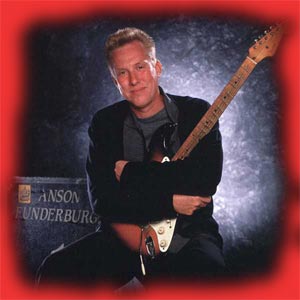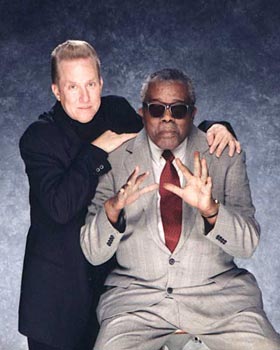
|
|||
|
|||
| Home |
| Gallery |
| Culture/ Technology |
| Fiction |
| Music |
| Poetry |
| Theater |
| What's New |
| About/Contact |
| Archive |
|
The heart of Texas Published May 2005
Funderburgh's blazing guitar style is the product of his central Texas upbringing. In his licks, one hears the influence of such celebrated Lone Star pickers as Freddy King, Albert Collins and Otis Rush. And where else but Texas would a grade school kid spend his spare time sitting around listening to vintage blues 45s? "There were always little toy guitars around the house when I was a kid," Funderburgh recalls. "My mother has a picture of me from 1957 with a little Roy Rogers guitar. But when she bought my first real guitar for me, the lady she bought it from also gave me a stack of singles. In those singles were Freddy King's 'Hideaway,' Albert Collins' 'Sno-Cone,' there was Bill Doggett stuff, Ray Charles, Jimmy Reed. When I heard 'em, I said, 'THIS is the stuff!' I really loved it." Funderburgh was an earnest fan and student of the blues from the time he was 10 years old, illustrated today by his slicing tone, innate good taste and encyclopedic knowledge of electric blues guitar styles. His devotion to the music remains readily, amusingly apparent when Funderburgh reminisces on his early heroes; Anson kicks himself in the pants if he forgets to mention a mentor, as if he'd somehow insulted their memory. "I like Buddy Guy, Otis Rush, Magic Sam – I like all those Texas guys," he says. "Albert Collins, Freddy King, Lightnin' Hopkins. T-Bone Walker! How can you forget him?! I like jazz stuff like Kenny Burrell and Billy Butler, who played with Bill Doggett. Oh! How could I leave out Robert Junior Lockwood? Louis and David Myers. Luther Tucker. I'm just a big fan of all of them. Hopefully, I've created my own little sound, but I've sure listened to everyone. I loved it back then and I still love it just as much today." Funderburgh was already a fixture on the Dallas nightclub scene at the ripe old age of 16. In the '70s, he released a few solo singles and recorded with a group called the Bee's Knees before starting up Anson Funderburgh & the Rockets. He signed with New Orleans-based Black Top Records in 1979 and stayed with the label through 1997, then moved to the Bullseye Blues label a few years ago.
"It just seemed like it made sense for both of us," says Funderburgh. "He was kind of in between work and I needed a singer and harmonica player, so I called him up and asked if he wanted to move to Dallas and start working together. We've been together ever since. Sam brings authenticity to the band. He's the real deal and he has a wonderful voice." Another Rocket who once passed through the crew was a scruffy-looking bassist with a wicked sense of humor named Mike Judge. After leaving the Rockets to pursue a career in animation, Judge became a huge success with "Beevis & Butthead" and "King Of The Hill." Funderburgh never envisioned Judge's work becoming a national sensation, "and if you asked him, he'd probably say the same thing," he chuckles. "Mike's success is absolutely phenomenal, and it couldn't happen to a nicer guy. He was a great musician and a very funny guy to have in the band." More recently, Funderburgh and Myers were accorded some over-due recognition in the form of a 2004 W.C. Handy Award. If that and a dime won't buy even a fraction of a venti soy latte, the Texan wastes no time pining over the fates – although he wouldn't complain if his career somehow got a little jolt in the keister. "If I said I didn't have dreams, I'd be telling you a story," he says. "I think my biggest dream would be to make as many people aware of this music as possible, to give more people the opportunity to hear what Sam and this band does. I enjoy what I do and it's important to me." |
Copyright © Turbula.net


 In 1982, Funderburgh met a kindred spirit in the booming-toned singer/harpist (and sometimes drummer) Sam Myers, who'd recorded with the legendary Elmore James and released a few solo singles in the early '60s. The duo cut an album together in 1984; Myers wound up joining the Rockets as frontman in 1986, forging a partnership that's lasted to the present day.
In 1982, Funderburgh met a kindred spirit in the booming-toned singer/harpist (and sometimes drummer) Sam Myers, who'd recorded with the legendary Elmore James and released a few solo singles in the early '60s. The duo cut an album together in 1984; Myers wound up joining the Rockets as frontman in 1986, forging a partnership that's lasted to the present day.